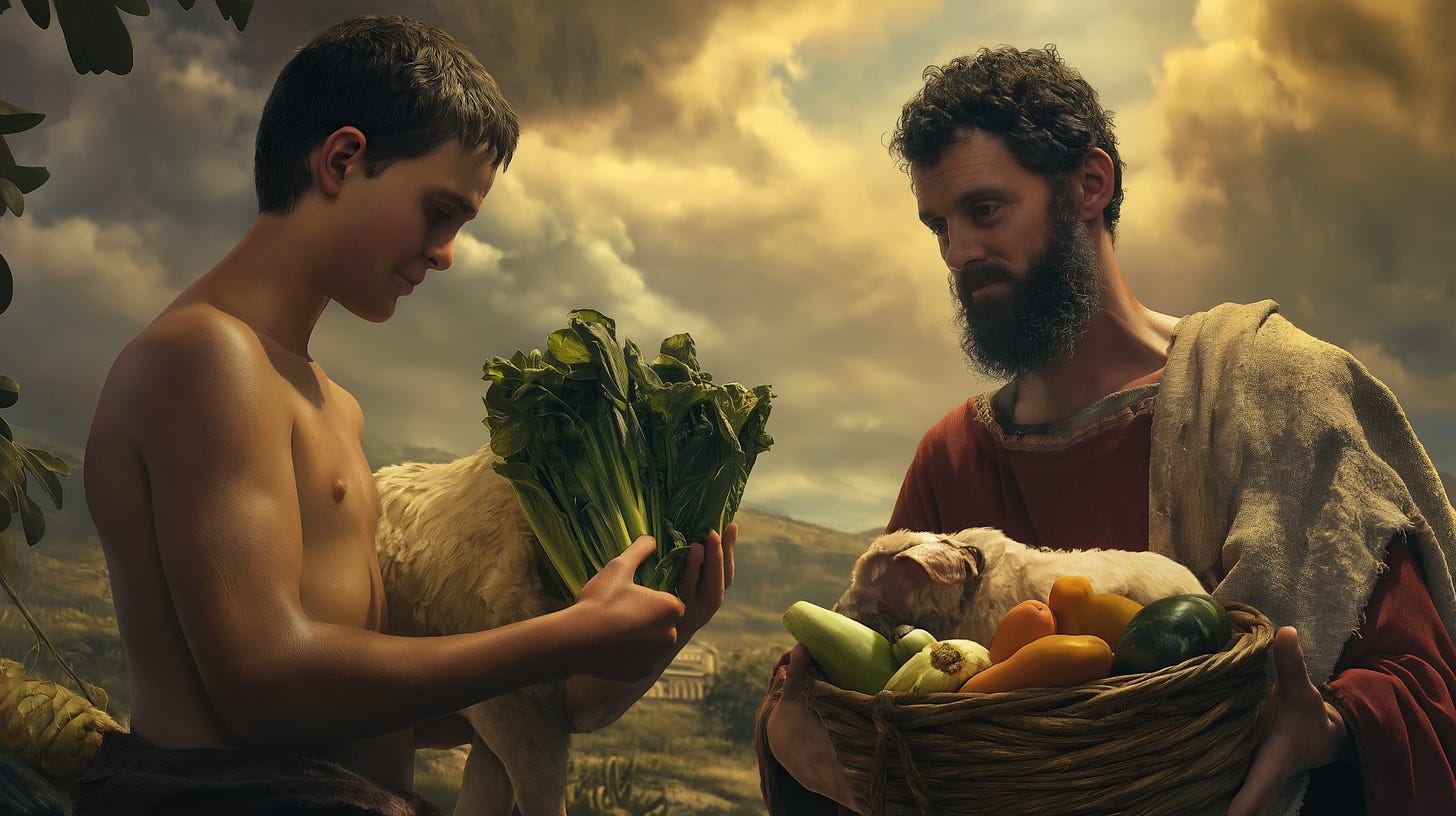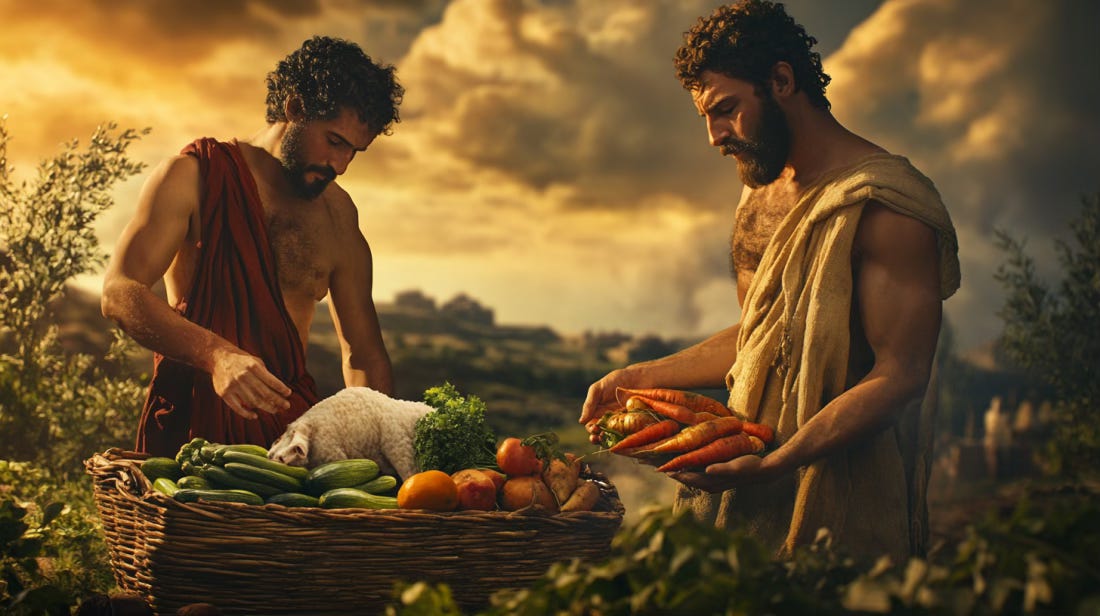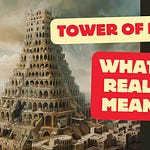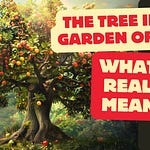Well, I hope you got a good nights sleep. I'm in India and it means that I'm awake at three or 4 AM most days. Just can't get the transition right this time.
Well, you can look at things as a curse or a blessing. I'm trying to find good use for all the extra time from waking up super early rather than just watching TV or looking at my phone. Today, I spent hours digging through the story of Cain and Abel. It's so tragic that in the first generation of natural-born humans the first baby grows up to be a murderer.
Take a minute right now to read the story in Genesis 4
Now Abel kept flocks, and Cain worked the soil. 3 In the course of time Cain brought some of the fruits of the soil as an offering to the Lord. 4 And Abel also brought an offering—fat portions from some of the firstborn of his flock.The Lord looked with favor on Abel and his offering, 5 but on Cain and his offering he did not look with favor. So Cain was very angry, and his face was downcast.
6 Then the Lord said to Cain, “Why are you angry? Why is your face downcast? 7 If you do what is right, will you not be accepted? But if you do not do what is right, sin is crouching at your door; it desires to have you, but you must rule over it.”
8 Now Cain said to his brother Abel, “Let’s go out to the field.”[d] While they were in the field, Cain attacked his brother Abel and killed him.
9 Then the Lord said to Cain, “Where is your brother Abel?”
“I don’t know,” he replied. “Am I my brother’s keeper?”
There’s a lot Here
It’s a very nuanced story, with lots of insights discretely woven into the way the narrative is delivered. I’m in love with Genesis 1-12. It’s a masterpiece. Every verse is important and I think this story has a lot to say to us—if we can just figure out what verse 7 is saying. More on that later.
I guess the thing that's always bothered me in this story is how much Spotlight is on Cain, the selfish, entitled, stubborn, immature man-child, not Abel, the good guy who was sincere and did everything right.
Abel is the first martyr, a man killed for his worship of our Creator. The scene describing the background and moment leading up to his murder is so painful. I can hardly read the story. Family is so important to me and to think that a big brother would use his little brother’s innocent trust to lure him away from the family so he could murder him just breaks my heart again and again.
Which makes it even harder to understand why God spends so much time in this story engaging Cain and trying to help him process his emotions.
Ruled by Emotions
Emotions, man, that’s the Gen Z theme! If the Eskimos have 1000 words for snow, young people today may end up with that many words for their feelings. In our generation, we were just told to suck it up and get on with life and not expect everything to be great. "Your attitude determines your altitude.”
On the other hand, something very real is happening inside the minds of young people. New Zealand, of all places, leads the world in suicides by young men age 12 through 17.
Cain was a man ruled by his emotions. In general, humans are portrayed as moral infants in the book of Genesis. God is working with us so we will grow up and assume the role for which we've been created.
We are made to be the likeness of God in the world. We all have a long way to go. Perhaps Cain never got there. His name in the Old Testament is connected to the line of rebellious humans who always resist everything God wants to do.
And yet, God is patient with Cain. He’s comforting him when most of us would kill him for what he had done to his innocent kid brother. (Maybe they were both teens, who knows?) How does this story affect you, emotionally? Leave a comment to share your processing of this tale.
Word Salad in Verse Seven
Scholars tend to hover around verse seven, the most “obscure” (incomprehensible) Hebrew in the Old Testament. The English translations have simplified it by ignoring all the problems in it. The editors just come to the conclusion that the verse is about the power of sin, and they harmonize the pronouns that are out of whack.
It's understandable to want to make things clear for the reader, but it's a real problem when you do it as a translator, in my opinion. I believe that everything in the Bible is there on purpose, so if a verse runs in the face of a cherished doctrine I think it's a dangerous practice to just "fix the verse”. I could show you a dozen places in any translation of the Bible where this has been done.
I'm not saying that the English translation of this verse is heretical, just that the ancient writer knew his language perfectly, and if he wanted it harmonized, he would have used the proper gender in his pronouns.
I explain more about all this in the video so if you're interested, I hope you will watch it. The point is whether this is a story where God warns Cain about the power of sin which is like a crouching lion ready to devour him, or maybe it’s a story where God reminds Cain that in order to walk with God, you have to do things God's way, regardless of your emotions or whether you think you have a better idea.
Driven by Emotions
Either way, Cain is wrestling with his own stubbornness, and is being driven by his emotions away from a posture of humble obedience to God. He is losing his proper desire to help other people know God and worship him properly.
Cain was the head of his tribe, the one whose example would set the direction for worship for future generations. It seems that the idea to make a sacrifice to God was actually initiated by him and enthusiastically joined by his little brother. How could something so beautiful so wrong?
Another Insight

In at the end of verse 7 the Hebrew says something more like “His emotional urge is toward you But you will rule over him.” which could generally mean either:
Abel feels the need for your attention so even though he is in the spotlight now, you aren’t being unseated as the leader. You will continue to lead him. -or it could mean—
Even though Abel is now correcting you for doing the sacrifice wrongly on purpose, you just have to take it and do an animal sacrifice rightly.
But relax, you will still end up being his leader when all this is fixed.
Which is correct? What do you think? Do your own research and make a comment here.
Where to look for answers?
You can start with asking any Bible questions in the Google search bar (or use chat GPT from open.ai if you are brave about new technology. It may amaze you).
You can also follow links to Bible scholar forums. I love the wealth of everyone bringing their best thinking to a task. We all do the work and we all celebrate in the harvest.
In the journey together!
Chuck & Sherry
















Share this post